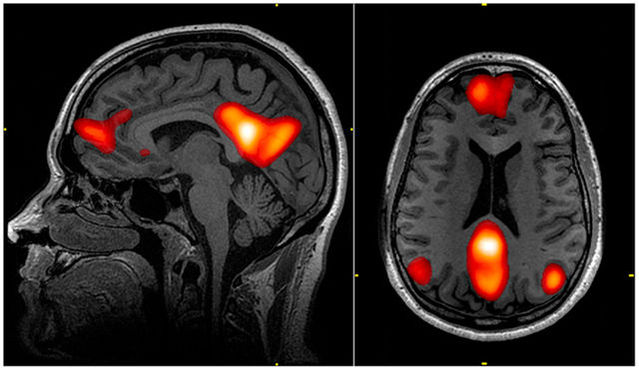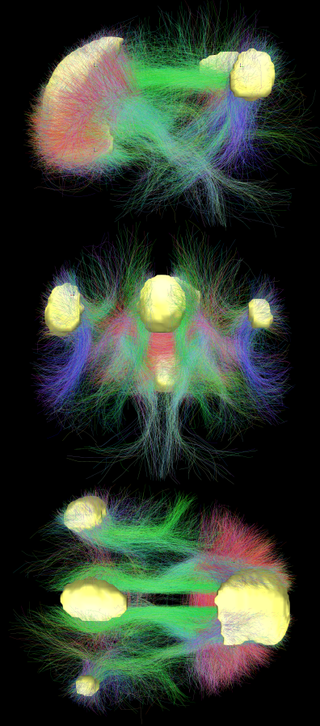Meditation
Mindfulness Meditation and the Vagus Nerve Share Many Powers
Mindfulness and vagus nerve stimulation can optimize the default mode network.
Posted February 5, 2016

This morning, I noticed an exciting correlation between two new studies which separately identified that optimizing the functional brain connectivity of the default mode network (DMN) can have significant psychological and physical health benefits.
The first study found that stimulating the vagus nerve dramatically reduces the severity of depression. The second study found that mindfulness meditation also optimized functional connectivity of the default mode network which lowered inflammation and improved the brain's ability to manage stress and anxiety.
After reading dozens of new scientific studies over coffee this morning, I had an 'aha' moment when I realized that these two studies—both published in the current issue of Biological Psychiatry—are using similar language to describe very different research.
Both of these studies offer holistic ways to optimize the functional connectivity of the default mode network using non-pharmacological interventions that have the power to improve psychological and physical well-being.
Non-Invasive Vagus Nerve Stimulation Can Significantly Reduce Depression
.jpg?itok=fwj_FWAv)
The first study used a new non-invasive vagus nerve stimulator (tVNS) to improve functional connectivity of the default mode network which reduced symptoms of major depressive disorder (MDD).
The February 2016 study, "Transcutaneous Vagus Nerve Stimulation Modulates Default Mode Network in Major Depressive Disorder," was published in Biological Psychiatry. This research was a collaboration between the China Academy of Chinese Medical Sciences and Harvard Medical School.
Patients with major depressive disorder who volunteered to participate in this study either received the new transcutaneous VNS or a 'sham' VNS, which served as a placebo. Then, they underwent a functional neuroimaging (fMRI) scan both before and after one month of treatment. When the researchers compared patients who received real or sham VNS, they found that the patients who received real VNS showed significant improvement of their depressive symptoms.
The real breakthrough of this new vagus nerve stimulator is that it's inexpensive and completely non-invasive. The device sits in the ear like a pair of headphones. Traditional VNS is a neurostimulation technique that has been used to alleviate treatment-resistant symptoms of depression. Typically, VNS is costly and requires potentially risky neurosurgery to implant the device.
In a press release, lead author Peijing Rong concluded, "This non-invasive, safe and low cost method of depression treatment can significantly reduce the severity of depression in patients and shows promise for future use."
Mindfulness Meditation Alters Default Mode Network Brain Connectivity
The second study identified that practicing mindfulness meditation improves the functional connectivity of the default mode network which lowers a biomarker for inflammation (Interleukin-6) while improving executive control and stress resilience.

The Carnegie Mellon University (CMU) researchers identified how mindfulness meditation optimizes brain connectivity and lowers stress. The fMRI brain scans from this study showed that mindfulness meditation training increased the functional connectivity of the participants' resting default mode network in areas directly linked to attention and executive control.
The February 2016 study, "Alterations in Resting State Functional Connectivity Link Mindfulness Meditation with Reduced Interleukin-6: A Randomized Controlled Trial," was published in Biological Psychiatry.
For this randomized controlled trial, 35 job-seeking, adults—who were experiencing the stress of unemployment—were enrolled in an intensive three-day mindfulness meditation retreat program or a well-matched relaxation retreat program that did not have a mindfulness component.
The participants who completed the mindfulness meditation program showed changes in brain functional connectivity and reduced Interleukin-6 which accounted for the lower inflammation levels. Participants who relaxed, but didn't practice mindfulness meditation, did not show similar outcomes.
In a press release, David Creswell, lead author and associate professor of psychology in the Dietrich College of Humanities and Social Sciences at CMU, said,
"We've now seen that mindfulness meditation training can reduce inflammatory biomarkers in several initial studies, and this new work sheds light into what mindfulness training is doing to the brain to produce these inflammatory health benefits.
We think that these brain changes provide a neurobiological marker for improved executive control and stress resilience, such that mindfulness meditation training improves your brain's ability to help you manage stress, and these changes improve a broad range of stress-related health outcomes, such as your inflammatory health."
Conclusion: Mindfulness Meditation and Vagus Nerve Stimulation As a Dynamic Duo

The most exciting aspect of these studies is the prospect of combining mindfulness meditation with the new non-invasive vagus nerve stimulator to create a double whammy that leads to a wide range of psychological and physical health benefits.
Currently, I listen to an 'Om/Aum' playlist from iTunes when practicing my daily mindfulness meditation. I can easily see plugging in the new VNS headphone-like device while meditating to reap all the benefits of both mindfulness meditation and vagus nerve stimulation simultaneously.
Both of these studies offer inexpensive and effective ways to improve people's health without the use of pharmaceuticals or invasive surgeries. Stay tuned for more on the fascinating interconnections between the vagus nerve, mindfulness meditation, and the default mode network.
To read more on this topic, check out my Psychology Today blog posts,
- "How Does the Vagus Nerve Convey Gut Instincts to the Brain?"
- "The Neurobiology of Grace Under Pressure"
- "Psychotherapy Can Dramatically Improve Your "Gut-Brain Axis""
- "10 Ways Mindfulness and Meditation Promote Well-Being"
- "The Neuroscience of Mindfulness Meditation and Pain Relief"
- "How Does Meditation Reduce Anxiety at a Neural Level?"
- "5 Neuroscience Based Ways to Clear Your Mind"
© 2016 Christopher Bergland. All rights reserved.
Follow me on Twitter @ckbergland for updates on The Athlete’s Way blog posts.
The Athlete’s Way ® is a registered trademark of Christopher Bergland.




